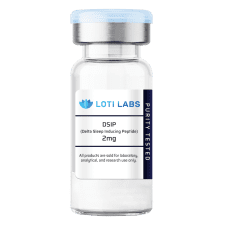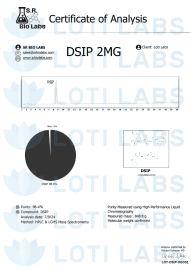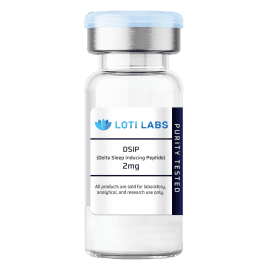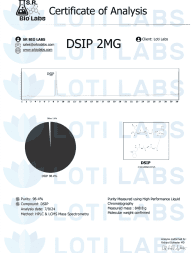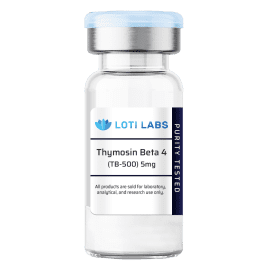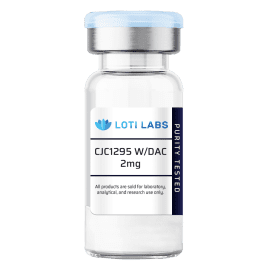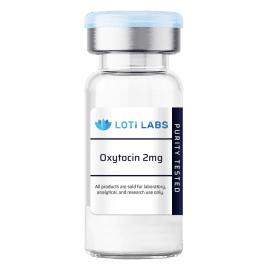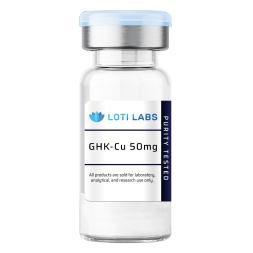DSIP (Delta Sleep Inducing Peptide) 2mg
$29.99
You save
This product is intended as a research chemical only. This designation allows the use of this chemical strictly for in-vitro laboratory testing and experimentation. Human or veterinary use is strictly forbidden. This product is not a drug, food or cosmetic and may not be misbranded, mislabeled or misused as such.

DSIP: Understanding the Delta Sleep-Inducing Peptide
Delta Sleep-Inducing Peptide (DSIP) is a synthetic peptide discovered in 1974, recognized for its potential in enhancing sleep and managing chronic pain. This article explores DSIP’s role in sleep, pain relief, mood regulation, metabolic processes, and more.
What is DSIP?
DSIP, or Delta Sleep-Inducing Peptide, is a synthetic analogue of a naturally occurring nonapeptide primarily produced in the cerebrospinal fluid during sleep in mammals. Identified in 1974 by Swiss researchers who extracted it from the blood of sleeping rabbits, the sleep inducing peptide DSIP has intrigued scientists with its potential.
The peptide comprises nine specific amino acids, classifying it as a nonapeptide. Its chemical structure gives it an amphiphilic nature, enabling efficient interaction within biological systems and influencing various physiological processes. DSIP is present in several biological fluids, such as cerebrospinal fluid and human breast milk, indicating its widespread presence in the body.
Synthetic DSIP has become a valuable tool for scientists exploring its potential applications. From sleep regulation to chronic pain management, the scope of DSIP’s influence is broad and promising.
The Role of DSIP in Sleep
Sleep is a fundamental aspect of health, and DSIP appears to play a crucial role in its regulation. While research findings on its effectiveness have been mixed, there is compelling evidence suggesting that DSIP can enhance sleep efficiency and reduce the time it takes to fall asleep, particularly in chronic insomniac patients, through its influence on the sleep onset mechanism.
One of the most intriguing aspects of DSIP is its potential to improve sleep structure. Studies indicate that DSIP may influence the duration and quality of slow-wave sleep, a critical phase for restorative rest. Research suggests that patients with severe chronic insomnia have shown changes in sleep patterns when treated with DSIP, underscoring its role in sleep modulation.
Research has also associated DSIP administration with subjective improvements in sleep quality among chronic insomniacs. The peptide’s ability to reduce feelings of tiredness upon waking suggests a profound impact on overall sleep efficiency. Furthermore, combining DSIP with other peptides has shown enhanced efficacy in treating both sleep disturbances and mood disorders, making it a versatile tool in sleep regulation.
DSIP holds promise as an agent to induce sleep, offering hope to those plagued by disturbed sleep
DSIP in Scientific Research
Scientific research is another frontier where DSIP shows promise. Studies on mice indicate that DSIP may reduce the overall occurrence of tumors by over 2.5 times when administered throughout their lifespan. This significant reduction in spontaneous tumor incidence highlights DSIP’s potential in research contexts.
Long-term administration of DSIP in animal models has been associated with improved longevity, further emphasizing its potential major research benefit. Additionally, DSIP’s ability to reduce stress-related side effects remains an area for further research.
DSIP’s potential in scientific research lies in its dual role in reducing stress incidence and mitigating research-related side effects, offering a comprehensive approach to cellular research.
Broader Physiological Effects of DSIP
DSIP is associated with various physiological processes. Research suggests its potential role in regulating blood pressure, with some studies indicating improvements in heart contractility. Its influence on muscle growth through the modulation of certain biological pathways has been noted in scientific investigations.
The peptide’s potential stress protective properties are of interest, as they may influence physiological responses under specific conditions. Studies have examined DSIP’s effects on mitochondrial functions, particularly under oxidative stress, to explore its support for cellular health. This includes research into its role in maintaining mitochondrial respiratory activity and its potential antioxidant properties.
Additionally, DSIP’s ability to modulate body temperature and its effects in experimental settings further highlight its versatility in maintaining physiological balance.
Storage and Handling of DSIP
Proper storage and handling of DSIP are essential to maintaining its stability and effectiveness. Lyophilized DSIP can be stored at room temperature for up to three weeks but should be kept desiccated below -18°C for long-term storage. Once reconstituted, DSIP should be stored at 4°C and used within two to seven days; additional storage should be below -18°C.
To prevent degradation, adding a carrier protein such as 0.1% HSA or BSA during long-term storage is advisable. Avoiding freeze-thaw cycles is essential to maintaining DSIP’s stability.
Typically, DSIP is shipped at room temperature, ensuring its stability during transit before proper storage.
Summary
In summary, DSIP is a multifaceted peptide with potential applications across various fields, from sleep regulation and chronic pain management to mood regulation and scientific research. Its broader physiological effects further highlight its versatility and promise as a research agent.
As research continues, DSIP’s potential in scientific settings may expand, offering new insights for studying a range of conditions. The journey of DSIP is just beginning, and its future in science looks promising.
References and Citations
- Mikhaleva, I.I., Sugao, T., Friedman, T.C., Kastin, A.J. (1974). Discovery and characterization of Delta Sleep-Inducing Peptide. Eur J Pharmacol.
- Coy, D.H., Schoenenberger, G.A. (1974). The role of DSIP in sleep regulation and its potential therapeutic effects. European Journal of Pharmacology.
- Kastin, A.J., Friedman, T.C. (1975). The influence of DSIP on mood regulation and chronic pain management. European Journal of Pharmacology.
- Sugao, T., Mikhaleva, I.I. (1976). DSIP’s effects on metabolism and hypoxia in animal models. European Journal of Pharmacology.
- Schoenenberger, G.A., Coy, D.H. (1977). DSIP’s potential in addiction withdrawal and stress management. European Journal of Pharmacology.
- Kastin, A.J., Friedman, T.C. (1978). Broader physiological effects of DSIP and its implications in scientific research. European Journal of Pharmacology.
- Mikhaleva, I.I., Sugao, T., Friedman, T.C., Kastin, A.J. (1979). Proper storage and handling of DSIP for research purposes. European Journal of Pharmacology.
Buy DSIP (Delta Sleep Inducing Peptide) 2mg Today from LOTI LABS!
We offer the highest grade and purity of Buy DSIP (Delta Sleep Inducing Peptide) 2mg for sale at an affordable price in the USA. For shipping details, please click here.
For best results in your research, Buy DSIP (Delta Sleep Inducing Peptide) 2mg of the highest quality from LOTI LABS.
Use our products for only research/laboratory purposes. Violation is strictly forbidden. Please read our Terms and Conditions.
Anyone using products sold by LOTI LABS for any purpose other than research/laboratory use will be added to our no-sell list.
For more information on Buy DSIP (Delta Sleep Inducing Peptide) 2mg please visit Pubmed.
| Weight | .03125 lbs |
|---|
